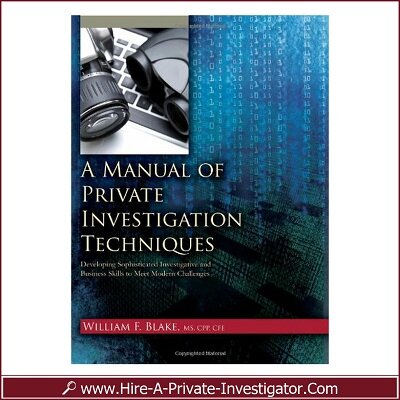When you purchase through links on our site, we may earn an affiliate commission. Here's how it works.
Home < Private Investigator Career < How to Become a Private Investigator
How To Become A Private Investigator

Becoming a private investigator is a very rewarding career choice, giving you the skills and opportunity to help others in troubled situations, in return for a good income.
The purpose of this guide is to show you how to become a private investigator and give you insight of what it takes to successfully move into the career of being an investigator. We will provide you with a clear step-by-step path, covering the qualities, what you need to learn (and do), to become a private detective.
If you're not sure what a private investigator is, or what they do, then read this article first - what is a private investigator - and then come back to this one. Let's get started...
Have You Got What It Takes To Become A Private Investigator?
On this step we're going to help you decide whether or not a private investigator career is for you. We're going to help you iron out any doubts or uncertainties, so you know for sure you want to become a private investigator, and not waste your time and money. We want to sort out those who truly want it as a career - and are willing to put in the effort, training and expense - from those who don't.
First of all, think about why you decided you want to become a PI. What's the reason?
- Was it out of boredom and you thought it would make life more interesting?
- Was it because you saw a detective movie or read a novel?
- Was it out of trying to impress others?
- Did you want to get revenge on someone by finding out their dirty secrets?
- Was it just because you fancy doing it out of some whim?
If it's any of the above reasons then you really need to rethink, or look for another career!
Here are some great reasons for being a private investigator:
- To want to help others with troubling situations
- To want to stand up or fight for an honorable cause
- To want to help improve society, people, or businesses
- To want to spread awareness of injustices, or right those wrongs
Still want to be a private investigator? Great! Read on...
Licensing and Legal Requirements of Being a Private Investigator
We're assuming now that by moving on to read this next step you are serious about being a private investigator. Well done! We're glad we haven't put you off. Now we'll look at the requirements of becoming a private investigator from two angles.
1. Character - the personality and behavior of a PI2. Legal - State or Country legal requirements
Character - Personality and behavior of a private investigator
What should the character of a private investigator be? It's fairly safe to assume that all states and countries (where licensing is concerned) require an individual to have no criminal record. But what does that really mean?
We know from experience someone doesn't have to have a criminal record to be a criminal - they just haven't been found out. We know from experience there are bad apples in any profession without criminal records that perhaps should have one. We know this isn't a perfect world, but nevertheless, someone wanting to become a private investigator should have a high sense of ethics.
Here's our list of qualities ALL private investigators should have:
Ethical: A private investigator needs to be highly ethical, being able to act rationally in difficult situations and not be swayed into unethical, bad practices.
Inquisitive: A PI should have an enquiring mind and be able to sift through data logically, making sense of what they find.
Tenacious: An investigator has to be able to push through barriers that prevent ongoing investigation.
Resourceful: An investigator needs to be a solver, coming up with solutions where there seem to be none.
Further personal abilities and skills a private investigator should possess are:
- Excellent communication in both spoken and written form
- Excellent observation skills
- Strong analytical skills
- Highly confident (but not arrogant)
- Ability to work with others and alone
- Able to be patient and show empathy
Now, if you were put off from becoming a private investigator because you think you don't have, or are lacking in these qualities; don't worry! The purpose of this guide is to get YOU to look at YOU. Its purpose is to help you to see; firstly - do you really want this as a career, and secondly - what you need to become, and do, to achieve it. If you found qualities in yourself that you are lacking, or weak in, then you can work on and improve them as you train. A truly great detective is one who knows their weak points and does something to improve them self.
Legal - State or country legal requirements for becoming a PI
If you want to know how to become a private investigator you will certainly need to know the legal requirements. As with other licensed professions, legal regulation is designed to protect public citizens against unauthorized or unqualified private investigators. It also serves to enforce high professional standards among those that are licensed. Depending on what State or Country you live - or plan to operate in as a private detective - will determine what legal requirements are needed. States requiring licensing will have their own specific licensing process and will vary from State to State. This process will generally include:
- Education
- Training
- Work Experience
- Application Procedures
For licensing; the minimum requirements needed to become a private investigator are usually:
- Age (minimum age usually between 18 and 25)
- Citizenship (a permanent resident, passport holder)
- Criminal Record (No criminal record)
- Mental State (mentally stable)
- Drugs (free from drug use)
To get your private investigator license you will generally need to:
- Achieve the minimum licensure requirements
- Achieve the required education and/or experience for licensure
- Complete a background check
- Complete a license application and provide the necessary documentation
- Pass a private investigation course of examination
- Maintain your license through continued education and license renewal
To get the exact private investigator licensing requirements for your State see our table below:
Private Investigator Licensing by StateYou can learn more about private investigator licensing requirements for your State just by clicking on the relevant link below. | |||
State | License Required | State | License Required |
Yes | Yes | ||
Alaska | Yes | ||
Yes | Yes | ||
Yes | Yes | ||
Yes | Yes | ||
Yes | Yes | ||
Yes | Yes | ||
Yes | Yes | ||
Yes | Yes | ||
Yes | Yes | ||
Yes | Yes | ||
Idaho | No | Yes | |
Yes | Yes | ||
Yes | Yes | ||
Yes | Yes | ||
Yes | South Dakota | No | |
Yes | Yes | ||
Yes | Yes | ||
Yes | Yes | ||
Yes | Yes | ||
Yes | Yes | ||
Yes | Yes | ||
Yes | Yes | ||
Mississippi | No | Yes | |
Yes | Maybe | ||
Get Your Private Investigator Training and Work Experience
Before individuals can become licensed private investigators they usually need to have some level of work experience in the investigative field, as well as some form of education, or pre-licensure training. The training and work experience needed to become a private investigator varies from State to State. So be sure to check your State requirements first (see the table above). Private investigator training is an important part in how to become a private investigator, not just at the start of the career, but throughout. You must learn the basic and advanced skills if you want to succeed and become a highly skilled investigator. Two avenues of gaining pre-licensure training and education are:
- University Higher Educational Programs
- Private Investigator Undergraduate Education Programs
University higher educational programs for private investigators
Completing some formal educational program, such as gaining an associate’s or bachelor’s degree in criminal justice, will provide you with the educational qualification needed for licensing. You will also gain a basic understanding of the criminal justice system, which is important for becoming a private investigator. A Bachelor of Science degree in criminal justice can include the following courses:
- Introduction to the Criminal Justice System
- Criminology
- Criminal Investigation
- Criminal Justice Information Systems
- Criminal Procedure
- Criminal Law for Criminal Justice
- Applied Criminal Justice Ethics
- Research Methods in Criminal Justice
Private investigator undergraduate education programs
Another way of building your education level prior to license application is to complete an undergraduate academic certificate or diploma. Private investigator certificate and diploma programs are ideal for learning how to become a private investigator. These programs can be taught in a classroom, or online, and are sometimes taught by legal professionals or private investigators. These programs offer specific module training classes such as:
- Legal Principles and Requirements
- Communication Skills and Investigation
- Investigation Business Basics
- Sources of Information
- The Computer and Investigation
- Reporting
- Locating People
- Performing Background Investigations
- Observation and Description
- Surveillance
- Evidence
- Court-Related Issues for Private Investigation
- Sub Rosa and Undercover Investigations
- Competitive Intelligence and Corporate Espionage
- Homeland Security
- Interviewing and Truth-Verification Techniques
- Fingerprinting and Handwriting Analysis
- Firearms and Other Weapons
- Executive Protection
- Retail Security and Loss Prevention
- Marketing Yourself as a Private Investigator
How to get your private investigator pre-licensure work experience
The work experience needed to obtain a private investigator license is usually based on the number of hours worked. For example: an Indiana private investigator by State law needs to detail at least (two years) 4,000 hours or more of private investigative work. Whereas, a Nevada private investigator requires at least 5 years (2,000 hours each year, totaling 10,000 hours) experience as an investigator.
You should check your State's licensing requirements to see what work experience is needed (if any), as each State is different. Not all States require mandatory work experience to become a private investigator. If you've worked in Government or State law enforcement, or other legal related roles, or possibly the military, this can count towards your work experience. One of the difficulties of becoming a licensed private investigator - if you haven't worked in related fields - is gaining the legally required work experience. But how do you get it?
- Become a highly valuable asset and promote yourself
One way to get experience as a private investigator is to join an already operating licensed investigator, or investigation firm. You can ask them to take you on as a part-time, or full-time employee, or as an intern for a time until you prove yourself worthy of a more permanent position. You may even consider voluntary work as a PI.
The way to make yourself highly employable is by getting as much PI training and education as you can and become a highly valuable asset. No detective agency will take on anyone that doesn't have something valuable to offer them in return. So offer them something they can't resist. If you're serious about becoming a private detective and lack experience and training - GET TRAINED!
Apply For Your Private Investigator License
Once you have built up your training and experience, the next step is to apply for your private investigator's license for the state you intend to work. Generally, candidates are required to provide the state's regulatory licensing body with the following:
- A notarized application
- A full set of fingerprints for a comprehensive background check
- Personal and professional references
- Documentation regarding professional experience
- Documentation and/or diplomas regarding education
- Proof of a surety bond
- Fees for the application, license, fingerprinting, and background check
Pass the State exam for private investigator licensure
Some states require applicants to pass an examination before they can be licensed as a private detective. These examinations assess applicants on their knowledge of local State level laws and procedures, as well as rules and regulations relating to working as a private investigator and operating a private investigation business. The exam is usually taken after applying for a State investigator license. State examinations for private investigators assess a candidate’s understanding on the following subjects:
- State and Federal Law
- Judicial System
- Legal Procedures
- Legal Privacy Requirements
- Civil and Criminal Law
- Types of Investigation
State examination private investigation training programs
The State private investigator examinations can be complex due to the amount of information covered and it is advised candidates prepare for the exam. Some States require candidates to complete a training program before they apply for a private investigator license. This may include a 60 hour entry-level private investigator training program. It's a good idea to enroll on one of the State-approved basic training courses before you take the State exam. This can give you additional knowledge, not just for the examination, but to use in your private investigator career. Some schools offer a 40 hour private investigation training course designed to prepare students for the State exam.
Continued Private Investigator Training and Specialization
Private investigator continued education is a must if you want to stay on top of your game. Many States, as part of your PI license renewal, require you to have completed some form of investigator continued education. This is usually built up of a number of hours over a 1 or 2 year period, depending on which State you operate. The number of hours required vary, for example; Iowa private investigators are required to do 12 hours of continued education every 2 years and Kansas investigators 8 hours every 2 years. Considering how laws, procedures, techniques, and technologies change, it is wise after becoming a private investigator to keep up to date on all aspects of investigative fields. 8 to 12 hours in 2 years isn't nearly enough!
Continuing education is an excellent way to stay current and to learn the newest techniques and theories related to the field of private investigation. If you want to be the best, if you want to become an expert private investigator - TRAIN, TRAIN and CONTINUE TRAINING throughout your PI career.
Private investigator training for career specialization
The scope of work of a private investigator is a very broad and sweeping one, covering many fields and needing many various skills. Most investigators perform all the usual basic investigative functions, such as surveillance and finding missing people, but you can specialize in your career - choosing a private investigator job that focuses on one particular area. You may wish to do additional courses in one of these basic areas and focus solely on becoming highly skilled in this service. There are many areas you can receive specialized investigator training in courses such as:
- Computer Forensics
- Insurance Investigations
- Forensic Accounting
- Technical Surveillance Counter Measures (TSCM)
- Surveillance Specialist
There are many private investigator schools offering these types of specialist courses, and many private investigator associations offer training courses to their members.
What Now?
Knowing the steps of how to become a private investigator is simple, just locate your State's requirements and DO what is necessary. You just have to DO the steps needed to get you there, and if you really want to become an investigator you will make it happen. Good Luck!
Books and Guides to Becoming a Private Investigator

PI test practice questions and review cards for the private investigator.

Provides the essential tools you need to become a successful private investigator.

Private investigator study guide and practice test questions for private investigator exams.

Developing sophisticated investigative and business skills to meet modern challenges.

Master the techniques of the pros to examine evidence, trace down people, and discover the truth.
Latest Articles







